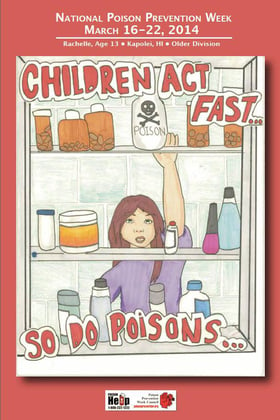It is National Poison Prevention Week (March 16 to 22, 2014), a time to check your homes for potential poison dangers that can harm both adults and children. In 2013, more than three million calls were made to poison centers nationwide, the Poison Prevention Week Council says.
The Centers for Disease Control and Prevention says poisoning is the leading cause of accidental death. Statistics say 90,000 children are hospitalized nationwide and an estimated 30 die each year from accidental poisoning.
The UMHS Pulse looks at what you can do to help eliminate poison-related hazards in the home because accidental poisonings are largely preventable.
“The first step in prevention is identifying poison danger,” says a press release from the Poison Prevention Week Council. “A poison is any substance that can harm someone if it is used in the wrong way, by the wrong person or in the wrong amount.”
What You Can Do to Prevent Accidental Home Poisonings:
- Use child-resistant packaging properly by closing the container securely after use.
- Keep all chemicals and medicines locked up and out of sight.
- Call the poison center 1-800-222-1222 immediately in case of poisoning.
- When products are in use, never let young children out of your sight, even if you must take the child or product along when answering the phone or doorbell.
- Keep items in original containers.
- Leave the original labels on all products, and read the label before using.
- Do not put decorative lamps and candles that contain lamp oil where children can reach them because lamp oil is very toxic.
- Always leave the light on when giving or taking medicine. Check the dosage every time.
- Avoid taking medicine in front of children. Refer to medicine as "medicine," not "candy."
- Clean out the medicine cabinet periodically, and safely dispose of unneeded medicines when the illness for which they were prescribed is over.
What to Do If You Think Someone Has Been Poisoned
If someone may have been poisoned, call the toll-free Poison Help Line at 1-800-222-1212, which connects you to your local poison center, to speak with a poison expert right away. Below is a checklist to help you in the event of a poisoning.
- If the person is not breathing, call 911.
- If the person inhaled poison, get him or her fresh air right away.
- If the person has poison on the skin, take off any clothing the poison touched. Rinse skin with running water for 15 to 20 minutes.
- If the person has poison in the eyes, rinse eyes with running water for 15 to 20 minutes.
- Do not use activated charcoal when you think someone may have been poisoned.
For more information, visit the Poison Prevention Week Council website at www.poisonprevention.org
About UMHS:
Built in the tradition of the best US universities, the University of Medicine and Health Sciencesfocuses on individual student attention, maintaining small class sizes and recruiting high-quality faculty. We call this unique approach, “personalized medical education,” and it’s what has led to our unprecedented 96% student retention rate, and outstanding residency placements across the US and Canada.

Scott is Director of Digital Content & Alumni Communications Liaison at UMHS and editor of the UMHS Endeavour blog. When he's not writing about UMHS students, faculty, events, public health, alumni and UMHS research, he writes and edits Broadway theater reviews for a website he publishes in New York City, StageZine.com.















